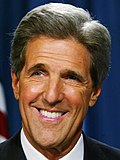
Wesley Kanne Clark is a retired United States Army officer. He graduated as valedictorian of the class of 1966 at West Point and was awarded a Rhodes Scholarship to the University of Oxford, where he obtained a degree in Philosophy, Politics and Economics. He later graduated from the Command and General Staff College with a master's degree in military science. He spent 34 years in the U.S. Army, receiving many military decorations, several honorary knighthoods, and the Presidential Medal of Freedom. Clark served as the Supreme Allied Commander Europe of NATO from 1997 to 2000, commanding Operation Allied Force during the Kosovo War.

From January 14 to June 8, 2004, voters of the Democratic Party chose its nominee for president in the 2004 United States presidential election.

The 2004 Iowa Democratic presidential caucuses were an election held on January 19 as part of the United States presidential primary. They were the first major test of some of the leading contenders for the Democratic Party's nomination as its candidate for the 2004 United States presidential election.
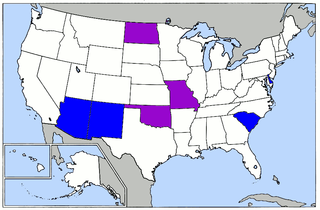
Mini-Tuesday was the name given to the February 3, 2004 U.S. presidential primary where several states, which to that point had participated in "Super Tuesday," cast their votes for the Presidential nominees of the 2004 Presidential election. Mini-Tuesday was also called Super Tuesday I. With the large number of states moving their election dates up to Mini-Tuesday for the 2008 election cycle, pundits have largely shied away from using the term again, instead choosing to reappropriate the term "Super Tuesday" to better represent the primaries held on that approximate date. The date is also known as "Super Duper Tuesday," "Giga Tuesday," and "Tsunami Tuesday," among others, with the term "Mini Tuesday" falling to apparent disuse for the time being.

The 2004 presidential campaign of John Kerry, the longtime U.S. senator from Massachusetts, began when he formed an exploratory committee on December 1, 2002. On September 2, 2003, he formally announced his candidacy for the Democratic nomination. After beating John Edwards, Howard Dean, Wesley Clark, and other candidates in the primaries, he became the Democratic nominee, challenging Republican incumbent George W. Bush in the general election. Kerry selected Edwards as his running mate.
The following is a timeline of events during the 2004 U.S. presidential election:
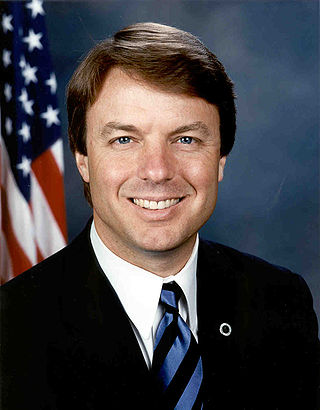
This article lists those who were potential candidates for the Democratic nomination for Vice President of the United States in the 2004 election. Massachusetts Senator John Kerry won the 2004 Democratic nomination for President of the United States, and chose North Carolina Senator John Edwards as his running mate on July 6, 2004. The Kerry–Edwards ticket would go on to lose the 2004 election to the Bush–Cheney ticket.

The 2004 United States presidential election was the 55th quadrennial presidential election, held on Tuesday, November 2, 2004. The Republican ticket of incumbent President George W. Bush and his running mate incumbent Vice President Dick Cheney were elected to a second term, defeating the Democratic ticket of John Kerry, a United States senator from Massachusetts and his running mate John Edwards, a United States senator from North Carolina. As of 2020, this is the only presidential election since 1988 in which the Republican nominee won the popular vote and the only presidential election since 1984 in which the incumbent Republican president won re-election. Due to the higher turnout, both major party nominees set records for the most popular votes received by a major party candidate for president; both men surpassed Reagan's record from 20 years earlier. At the time, Bush's 62,040,610 votes were the most received by any nominee for president, although this record would be broken four years later by Barack Obama. Bush also became the only incumbent president to win re-election after previously losing the popular vote.
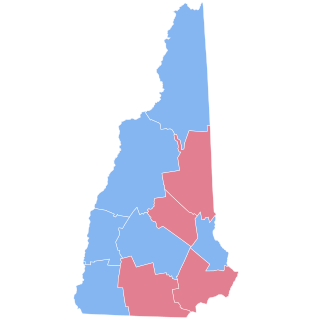
The 2004 United States presidential election in New Hampshire took place on November 2, 2004, and was part of the 2004 United States presidential election. Voters chose four representatives, or electors to the Electoral College, who voted for president and vice president.

The 2004 Missouri Democratic presidential primary on February 3, 2004 determined the recipient of the state's 88 delegates to the Democratic National Convention in the process to elect the 44th President of the United States. It was an open primary.

The 2004 New Hampshire Democratic presidential primary was held on January 27, 2004. Taking place eight days after the Iowa caucuses, it marked the second contest to take place during the Democratic party's 2004 primary season, as well as the first actual primary to take place.

The 2004 Arizona Democratic presidential primary took place on February 3, 2004, as part of the 2004 United States Democratic presidential primaries. The delegate allocation is Proportional. the candidates are awarded delegates in proportion to the percentage of votes received and is open to registered Democrats only. A total of 55 delegates are awarded proportionally. A 15 percent threshold is required to receive delegates. Frontrunner John Kerry won the primary with former general Wesley Clark coming second.

The 2004 presidential campaign of John Edwards, U.S. Senator from North Carolina, began on September 16, 2003.

The 2004 presidential campaign of Howard Dean, 79th Governor of Vermont, began when he formed an exploratory committee to evaluate a presidential election campaign on May 31, 2002. Dean then formally announced his intention to compete in the 2004 Democratic primaries to seek the Democratic Party's nomination for President on June 23, 2003. Dean dropped out of the race in February 2004 after a poor showing in the Wisconsin primary.

The District of Columbia held a primary on January 13, 2004 and caucuses on February 14, 2004 during the 2004 Democratic presidential primary season. Delegates were only allocated in the February 14 caucuses.

The 2004 Oklahoma Democratic presidential primary, part of the process of selecting that party's nominee for President of the United States, took place on February 3, one of the seven nominating contests of 2004's "Mini-Tuesday". The primary election chose 40 pledged delegates to represent Oklahoma at the 2004 Democratic National Convention. The remainder of Oklahoma's 47 delegates consisted of unpledged superdelegates not bound by the results of the primary. The election was a closed primary, meaning that only registered Democrats could vote in this election. Wesley Clark won the primary by a razor-thin margin over John Edwards.
Various opinion polls took place ahead of the 2004 Democratic Party presidential primaries.

The 2004 California Democratic presidential primary was held on March 2, 2004, the same day as the Republican primary. Senator John Kerry overwhelmingly won the primary over rivals Senator John Edwards, Congressman Dennis Kucinich, and Reverend Al Sharpton. The primary was open to both registered Democrats and unaffiliated voters. 440 delegates were at stake, with 370 tied to the March primary.
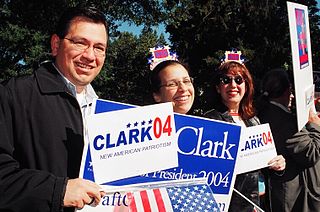
The 2004 presidential campaign of Wesley Clark, a retired U.S. Army general who served as Supreme Allied Commander Europe (SACE) from 1997 to 2000, officially began on September 17, 2003. A movement to draft Clark for the Democratic nomination began in April 2003, and was led by activists who felt Clark's military service and criticism of the War in Iraq made him a strong candidate. Prior to announcing his campaign, Clark was not known to have publicly identified with either party.
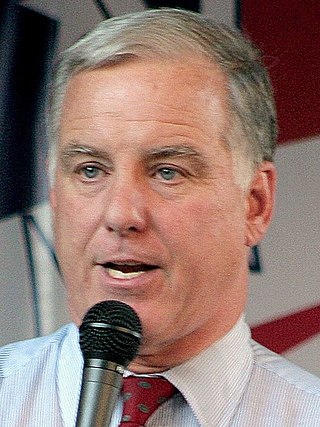
The 2004 Vermont Democratic presidential primary took place on March 2, 2004, as part of Super Tuesday along with other primaries and caucuses held throughout the country. Vermont's 15 pledged delegates were allocated based on the results of the primary.

